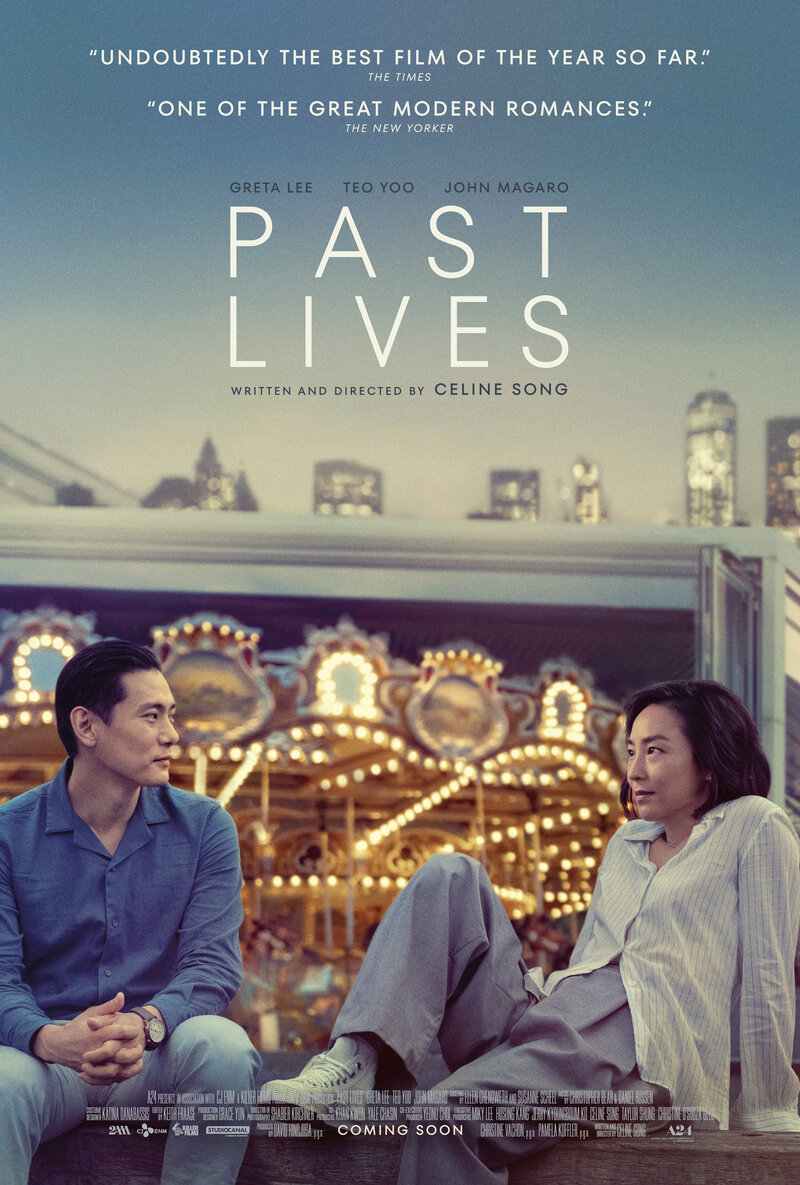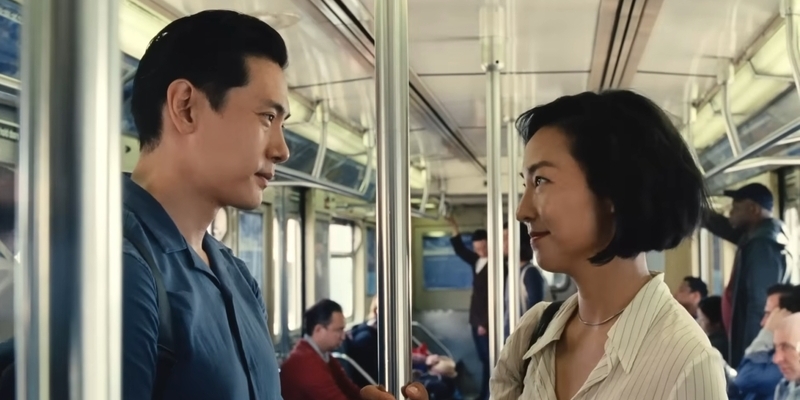
Review by
Eric Hillis
Directed by: Celine Song
Starring: Greta Lee, Teo Yoo, John Magaro, Seung Ah Moon, Seung Min Yim

Your first crush is a lot like your first pet; you learn a lot about
life when they go away. Burying a dog, cat, budgie or goldfish in the
backyard is often a child's first experience of death, and serves as a
means of preparing them for a lifetime of saying goodbye. First crushes
tend to fade out as both young parties realise there's nothing
substantial to their relationship beyond puppy love. But what if your
first crush was cruelly taken from you long before you made such a
realisation?
That's the question posed by writer/director Celine Song's
debut, Past Lives. As 12-year-olds in Seoul, Na Young (Seung Ah Moon) and Hae
Sung (Seung Min Yim) become each other's first crush. What Hae
Sung doesn't know is that Na Young is set to leave with her family for a
new life in Toronto. In a gesture that is either willfully ignorant or
cruel, Na Young's mother arranges for the two kids to go on a "date"
together. Young love blossoms until Sae Hung learns of Na Young's
imminent departure. Song closes out this chapter with a shot that might
be mistaken for split screen, as the two kids take divergent
paths.

12 years later we find Na Young, now going under the name Nora (now
played by Greta Lee), living in New York and chasing her dream of
becoming a playwright. Feeling nostalgic, she looks up old school
friends on social media and discovers Hae Sung (now played by
Leto's Teo Yoo) has been trying to find her. The two reconnect and
spend a lot of time over Skype. Promises are made to visit each other's
cities, but reality gets in the way and the pragmatic Nora decides it's
best to call off their fledgling relationship.
Another dozen years pass and Nora is now a successful playwright fully
settled into the bohemian New York lifestyle, sharing an apartment in
Greenwich Village with Arthur (John Magaro), the bearded Jewish
writer she married. When Hae Sung arrives in New York for a visit, Nora
agrees to meet her old friend.

You may be primed for a Before Sunrise style romance, but
both Nora and the film itself are far more rational in their approach to
such matters. Opening with an unseen commentator musing over the
relationship between Nora, Hae Sung and Arthur as they drink in a bar,
the movie goes on to become something of a meta dissection of romantic
storytelling. Much of this comes through Nora and Arthur being
storytellers themselves, and thus both wary of becoming the clichés of
the woman swept off her feet by a reunion with her first love and the
jealous husband. Displaying the sort of insecurities only a writer could
possess, Arthur grills his wife regarding the stability of their
marriage. "I'm where I'm meant to be," is Nora's ambiguous answer.
We learn that Nora initially married Arthur in order to obtain a
greencard. Fortunately the relationship developed into something
lasting, but it's a telling sign of Nora's pragmatism. Nora confesses
that Hae Sung's conservative Korean ways make her uncomfortable; it's
ironic then that she left a country where marriages often begin with a
connection based on pragmatism, only to enter a marriage of convenience
herself. Hae Sung's presence both disturbs and excites Nora. As she puts
its, in his presence she feels "very non-Korean, but also more Korean
than I've ever felt before."

Song explores the divergences between immigrants and natives through
Hae Sung's misguided hope that Nora will some day return to Korea and
Arthur's fear that she might connect with Hae Sung in a way she never
could with an American man. But both men have misjudged Nora, who is in
exactly the place she wants to be, physically if perhaps not
emotionally. Nora is "someone who leaves," as Hae Sung puts it with a
resigned acceptance. In this manner Past Lives is
something of an Asian-American cousin of the recent Irish drama
Lakelands, in which a homely young man is similarly forced to reckon with his
incompatibility with the sophisticated woman he loves.
With delicious ambiguity, Song occasionally teases a more traditional
romance lurking under her film's mature surface. When at a New York bar,
Nora and Hae Sung isolate themselves from Arthur by speaking Korean
(Song cleverly frames this in an awkward manner that suggests Arthur has
been torn from a more immaculately mounted set-up), we suspect this
might be the moment of raw confession, but instead the two use the
opportunity to have a grown-up conversation about why they don't belong
together. Hae Sung's previously sad eyes seem to curl with contentment
for the first time as Nora's pragmatism opens the cage he's trapped
himself in for close to a quarter of a century. And yet the movie's
closing moments leave us wondering if they've really been honest with
each other, or themselves. We know this isn't the sort of romantic drama
that will climax in a late dash to the airport, but its brilliance lies
in how it makes us wish for such a comforting cliché.


